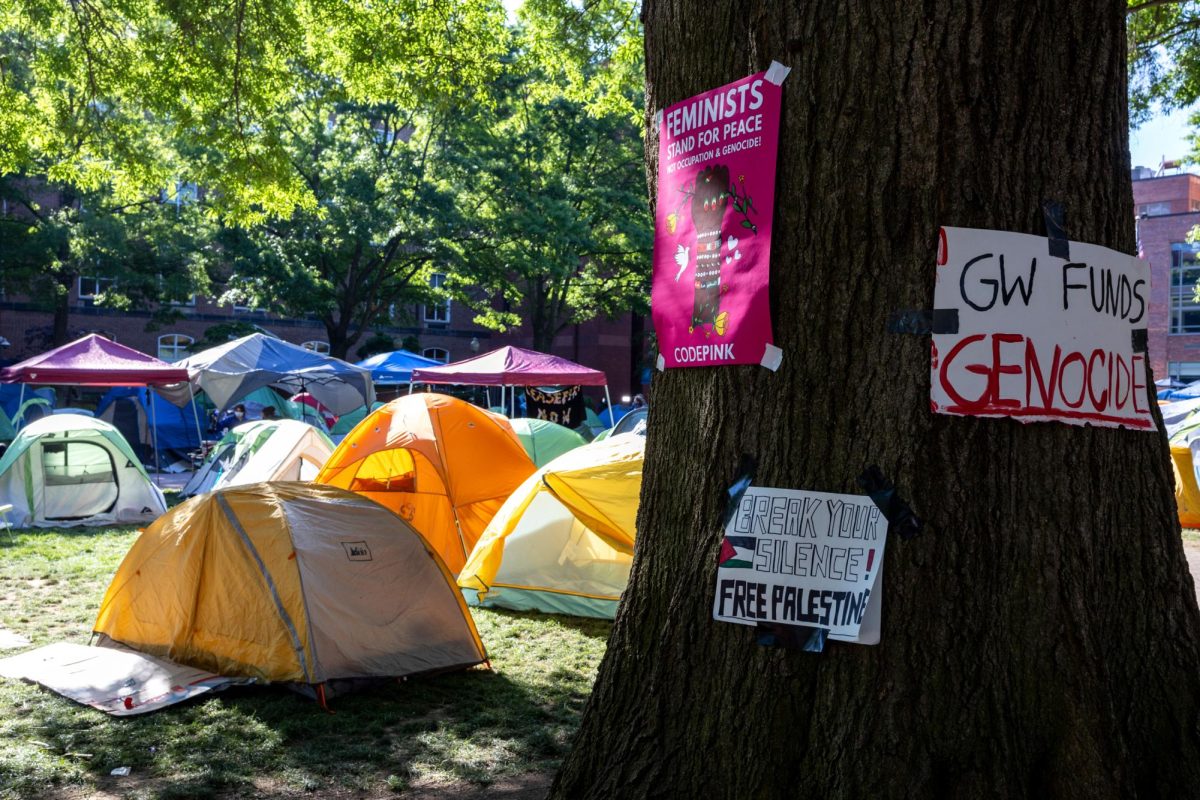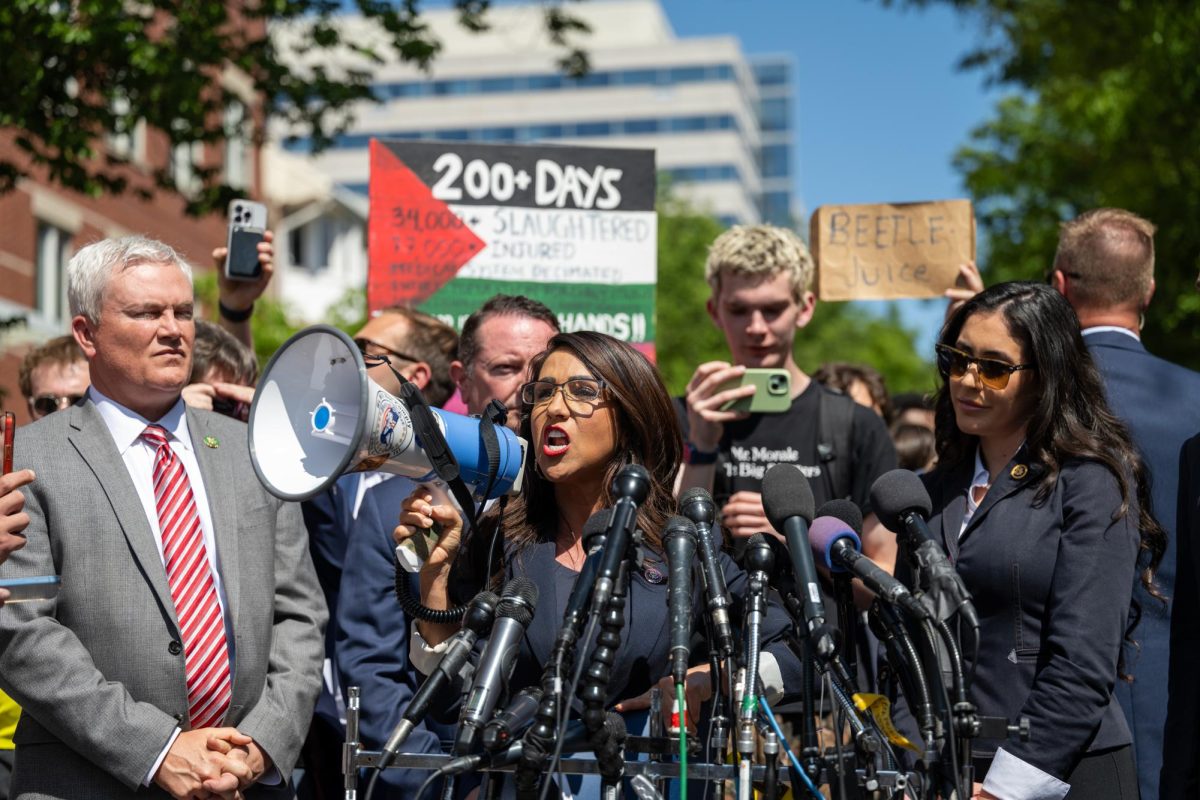
Emily Recko | Hatchet Designer
Source: SA General Allocations Budget Book FY 2018
The Student Association is giving more funding than ever before to student organizations for next academic year.
The SA awarded about $1.3 million to student groups in next year’s budget, about $300,000 more than last year as it began using money leftover from previous budgets for the first time. The overall budget pool soared to $1.8 million, a 38 percent increase from last year and double what it was just three years ago.
Members of the finance committee said the SA had more funding to give away this year because the committee tapped into rollover funds – money the SA had given student organizations in previous years but was never spent. They said the increase in funding would benefit student groups because they will have more access to money both upfront in the SA’s budget and through co-sponsorships given throughout the year.
Sen. Nate Pasko, ESIA-U and chair of the finance committee, said the committee asked the Center for Student Engagement for access to rollover funds this year in an effort to make the budget process more transparent.
The funds, which Pasko said had been building for a “couple years,” were not all previously put back into the SA’s budget. He said a percentage of the rollover funds were given to the SA each year, but that for the most part, they sat in an account untouched.
He said the funds will be accessible to the finance committee in making the budget every year going forward. He said he did not know how much money was in the funds this year, but access to the funding increased the overall budget pool.
“I strongly believe the budget meets the needs of our student organizations and provides a solid foundation for a vibrant student community,” Pasko said in an email.
The budget also got a funding boost from the Student Association fee, which has been gradually increasing each year since 2012. Students now pay $2.50 to the SA for each course credit hour they take, part of a six-year effort to double the fee from $1.50 to $3 for each credit hour by the 2018-2019 academic year.
This year, more than 300 student organizations received funding from the SA and about 160 received more money than last year.
Just one student organization – the Global Health Network, a group that networks with health industry professionals – was denied SA funding this year for failing to provide enough information about its requests, a far cry from 2015 when then-SA president Nick Gumas rejected the initial budget for denying funding to 20 percent of all student groups.
Pasko said the finance committee made a deliberate effort this year to avoid the controversy that has impacted the SA budget process in past years.
“A foundational goal of my committee was to be as uncontroversial – and therefore as transparent and professional – as possible in order to avoid any similar issues, so I was proud to see said goal come to fruition,” he said in an email.
Last year, the SA finance committee faced backlash from student organizations after it changed the budget process, opting to award less money upfront and reserve more for co-sponsorships doled out throughout the year. Some groups said the new policy was unfair and gave them less time to plan for the upcoming academic year.
This year, the SA has $450,000 in reserve to give away in co-sponsorships, a 36 percent increase from last year and a record high for the SA.
Pasko said the SA received about $3.5 million in requests this year and was able to award each student organization about a third of what they sought. The budget allocates an average of $4,058 to each student group, about $250 more than the average from three years ago.
Organizations mostly requested money to host performers and speakers and to cover fees for room rental, travel, lodging and food, Pasko said.
About 18.1 percent of the budget covers the cost of guest speakers and performers, while about 11.1 percent covered building room and rental fees.
Sen. Logan Malik, U-at-large, said this year’s budget gave multicultural student organizations and small student organizations a larger share of the funding pool. He said in past years large student groups were given too large of an advantage in the budget process.
This year, the Black Student Union received $23,500 – a massive 348 percent increase over last year – and the GW South Asian Society’s funds expanded by $26,800 to $36,050. Among other organizations, the Multicultural Greek Council, GW Association of Black Journalists and Muslim Students’ Association all had budget increases.
Malik, a member of the budget appeals committee, which reviews budget requests for student groups who are dissatisfied with their initial allocation, said relatively few organizations appealed their allocation this year.
About 41 organizations appealed out of a possible 60, nine fewer than last year, he said. The appeals committee worked with a budget of about $90,000 and handed out more than 99 percent of the funds.
“Had the original bill gone to the floor without the appeals process, there would have been some components of the bill that would have made it more difficult to support,” Malik said in an email. “However, I was not on the edge once organizations had gone through the appeals process and the few concerns were sufficiently corrected.”
Davone Morales, the creative director of GW-TV, said the organization had to appeal its allocation this year after receiving no money to cover the cost of renewing their website plan and only half the funding needed to purchase a black magic box, a technical board that would allow the organization to broadcast remotely.
“The process was very easy for us,” Morales said. “We provided the committee with an old invoice for the website and made our case for the black magic box. Our funding was approved within three days and we received the amount we needed.”
This year, GW-TV received an extra $695 after their appeal, bringing their total to $1,340.
Lauren Courtney, the president of the GW Feminist Student Union, said its roughly $3,500 funding increase would be used to fund new events next academic year.
She said the group wants to host more events, like this year’s production of “This___Body” – a collection of student-written monologues and performances – and possibly a feminist music festival.
“I think this is certainly an appropriate allocation, because we have excellent ideas and plans to contribute even more to the GW community,” she said in an email. “It feels like our organization is growing in support and recognition in a way that is really exciting.”




